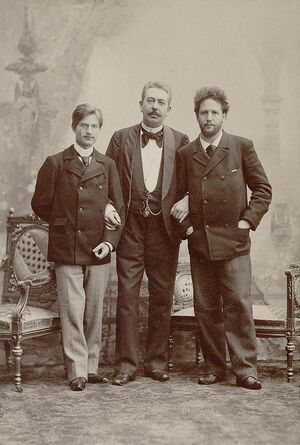Paul Collin and Paul Pabst: Difference between pages
No edit summary |
No edit summary |
||
| Line 1: | Line 1: | ||
{{picture|file=Paul | {{picture|file=Paul Pabst.jpg|caption='''Paul Pabst''' (1854-1897)}} | ||
German pianist, teacher and composer (b. 27 May 1854 {{NS}} in Königsberg, Prussia [now Kaliningrad, Russia]; d. 27 May/9 June 1897 in [[Moscow]]), born '''''Christian Georg Paul Pabst'''''; known in Russia as '''''Pavel Avgustovich Pabst''''' (Павел Августович Пабст). | |||
After receiving lessons from his father, the composer and performer August Pabst (1811–1885), Paul gave his first public recitals at the age of 11, studying with [[Anton Door]] at the Academy of Music and Lyric Arts in [[Vienna]], and later in Weimar with [[Franz Liszt]]. From 1875 he taught piano in Riga, and in 1878 was invited by [[Nikolay Rubinstein]] to teach piano at the [[Moscow]] Conservatory, where he became professor of piano in 1881. | |||
Tchaikovsky was a great admirer of Pabst's virtuosity, and was particularly impressed by his ''Paraphrase'' (1880) on themes from the opera ''[[Yevgeny Onegin]]''. As well as his virtuosic transcriptions, Pabst also composed many smaller works, almost exclusively for piano. | |||
== | ==Dedications== | ||
In 1893, Tchaikovsky dedicated the piano piece ''Polacca de Concert'' — No. 7 of the [[Eighteen Pieces, Op. 72]] — to Paul Pabst. | |||
==Correspondence with Tchaikovsky== | |||
One letter from Tchaikovsky to Paul Pabst has survived, dating from 1887, and has been translated into English on this website: | |||
* '''[[Letter 3344]]''' – 9/21 September 1887, from [[Maydanovo]]. | |||
One telegram from Paul Pabst to Tchaikovsky, dating from 19 April/1 May 1892 is preserved in the {{RUS-KLč}} at [[Klin]] (a{{sup|4}}, No. 3187). | |||
==External Links== | ==External Links== | ||
* [[wikipedia: | * [[wikipedia:Pavel_Pabst|Wikipedia]] | ||
* {{viaf| | * {{IMSLP|Pabst,_Paul}} | ||
* {{viaf|42026185}} | |||
[[Category:People| | [[Category:People|Pabst, Paul]] | ||
[[Category:Correspondents| | [[Category:Composers|Pabst, Paul]] | ||
[[Category: | [[Category:Correspondents|Pabst, Paul]] | ||
[[Category:Pianists|Pabst, Paul]] | |||
Revision as of 19:12, 19 August 2023
German pianist, teacher and composer (b. 27 May 1854 [N.S.] in Königsberg, Prussia [now Kaliningrad, Russia]; d. 27 May/9 June 1897 in Moscow), born Christian Georg Paul Pabst; known in Russia as Pavel Avgustovich Pabst (Павел Августович Пабст).
After receiving lessons from his father, the composer and performer August Pabst (1811–1885), Paul gave his first public recitals at the age of 11, studying with Anton Door at the Academy of Music and Lyric Arts in Vienna, and later in Weimar with Franz Liszt. From 1875 he taught piano in Riga, and in 1878 was invited by Nikolay Rubinstein to teach piano at the Moscow Conservatory, where he became professor of piano in 1881.
Tchaikovsky was a great admirer of Pabst's virtuosity, and was particularly impressed by his Paraphrase (1880) on themes from the opera Yevgeny Onegin. As well as his virtuosic transcriptions, Pabst also composed many smaller works, almost exclusively for piano.
Dedications
In 1893, Tchaikovsky dedicated the piano piece Polacca de Concert — No. 7 of the Eighteen Pieces, Op. 72 — to Paul Pabst.
Correspondence with Tchaikovsky
One letter from Tchaikovsky to Paul Pabst has survived, dating from 1887, and has been translated into English on this website:
- Letter 3344 – 9/21 September 1887, from Maydanovo.
One telegram from Paul Pabst to Tchaikovsky, dating from 19 April/1 May 1892 is preserved in the Tchaikovsky State Memorial Musical Museum-Reserve at Klin (a4, No. 3187).

